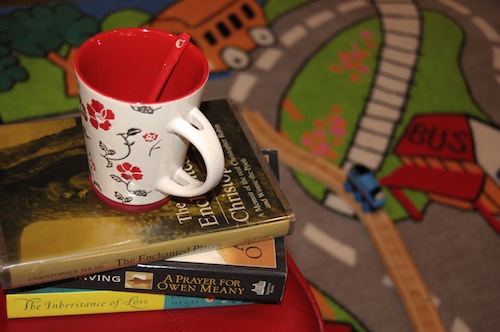 Photo: Heather A. Goodman
Photo: Heather A. Goodman
I sit down to write this essay, and my thoughts gather, separate, and change sides like Greek gods in war. Naturally, I complain to my husband.
“My life is too fractured to write anything. My thoughts aren’t working.”
“What are you writing about?” he asks.
“The fractured nature of life.”
I want to tell you about my reality, about how boring and splintered it can be, how chaotic and bland, how unexpected and structured it is. In other words, I want to tell you about the ordinariness of my life and how that ordinariness doesn’t feel as beautiful as Wendell Berry makes it out to be.
A glimpse: bits and pieces of a story or essay playing through my brain as I choo-choo trains and beep-beep trucks across the carpet; a garden once lush with tomatoes, peppers and herbs now overgrown with weeds, the basil and oregano so feral, they’ve become unusable; books ever ready on my iPhone so I can read a few paragraphs of this novel or that short story, a line or two of theology while breast-feeding in the middle of the night or stirring the soup for dinner.
I queue Sesame Street (a.k.a. “Melmo”) on Netflix (breaking our parenting pledge of no TV for the first two years) so I can bake a loaf of pumpkin bread (boxed) for book club, eyeing my pie plate with something like memory.
This is not the life of a writer, I think.
Shouldn’t I sink into story, half-forgetting where I am, which is in some undiscovered tea shop, while sunset breaks through the window blinds, an exotic brew on the table next to my Mac? Shouldn’t I contemplate the creation and the curse as I pull weed and caress tomato? Shouldn’t I reflect on the beauty of the slow as I knead a loaf of sourdough?
Philosophers, artists, and baristas blog about the balance of life — about simple motifs that emerge into the next fluidly, harmonies marked by cohesive tonal logic, melodies and accompaniment that converse. My life sounds more like an Ornette Coleman piece than a Haydn symphony — dissonant motifs interrupting each other over a regular but confusing rhythm created by two drummers who seem to be battling each other.
The truth? I like to romanticize about the mundane more than I like to live it. I wax eloquent about the everyday elements of the Eucharist while praying the Body of Christ doesn’t intrude too much on my everyday. I share pictures through Instagram of my gardening in spring but neglect the weeding in July. I update my Facebook status with, “My favorite part of spending every day with a toddler: rediscovering wonder. Who knew a rock could be so captivating?” But I spend the last couple of hours of the day praying Daddy will get home quickly to end the boredom.
The mundane is hard, tedious, and boring no matter how I dress it up with pretty words and ivory theology. I don’t want to figure out what to make for dinner again; I don’t want to put away that load of laundry (when I know I’ll just be washing it again in a couple of days); and (because I’m such a selfish being) I don’t want to give up my short writing time today to help a friend who broke her arm. I want to spend hours (in one sitting!) perfecting a paragraph, the taste of a strong English Breakfast brew on my tongue, then serve my family a chicken pot pie made from scratch and a salad picked from my garden.
Some days I have to decide between taking a shower and writing during naptime. Some days I pray that God will nourish us and be glorified in the microwaving of a frozen burrito. Some days my toddler interrupts my theological ponderings with lines from “The Duck Song” (“Got any grapes?”).
Some days I don’t want to be a writer so I can live the life of — and here, you must say this with googly eyes, hand on heart, etc., etc., etc. — a writer. I want to knit more (and perhaps actually finish one of the many projects on my list). I want to snap photographs of the ordinary (my dream ordinary, that is) that capture elements of life itself in the lighting, color, and simple composition. I want to design a room with found objects and family heirlooms in a way that invites people in yet gives the sense of privacy and intimacy and, mostly, inspires awe on Pinterest.
I want to sip more tea in silence.
Instead, I type a quick note about a short story on my iPhone while my toddler dumps pebbles on me (some of which work their way into my underwear) at the park. I let the dust collect on my mantle so I can get in one last edit on that story. I give up any knowledge of the latest indie movies and folk bands because as much as I want to indulge in all art forms (knowing that all art forms influence my own), I only have time for one these days.
And then I put away the rhythm of my writing to listen to a different rhythm — my toddler telling me (again) about the snowman in Costco who lost his nose.
My life, like Coleman’s music, may be a series of dissonant motifs and confusing rhythms. It may seem like it goes on and on and on for no reason and with no structure. But hey, Coleman won a Pulitzer prize for it. A girl can dream.
 Photo: Jirdavis via Flickr
Photo: Jirdavis via Flickr
Heather A. Goodman spends most of her day driving miniature trains across her carpet, sponging off spit-up from her collar, and dancing to The Muppets and VeggieTales. Her fiction has been published in Ruminate Magazine, Relief Journal, Generate Magazine, and other online journals, and her short screenplays have been produced for film festivals and churches. Her nonfiction has been published in various print and online magazines and blogs. She lives outside of Dallas, TX, with her husband, two children, and a few imaginary friends.















